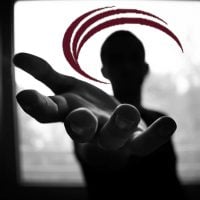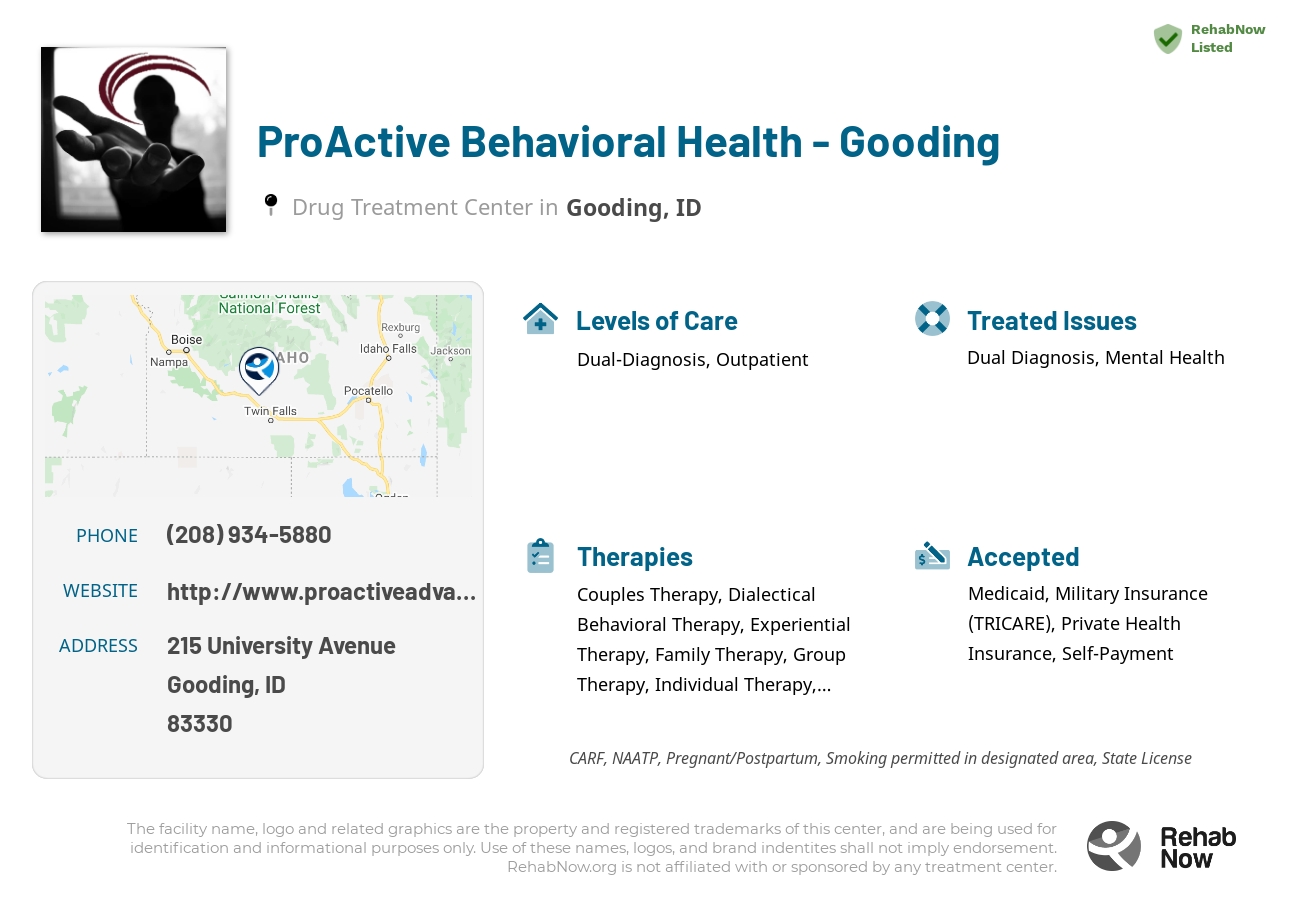ProActive Behavioral Health - Gooding
Drug Rehab Center in Gooding, Idaho
ProActive Behavioral Health is a treatment center with numerous therapy options, including dialectical behavioral therapy and experiential therapy, that specializes in providing dual-diagnosis, mental health, substance abuse, and addiction treatment in Gooding, Idaho, established in 2002.
About This Idaho Facility
ProActive Behavioral Health specializes in providing dual-diagnosis, mental health, substance abuse and addiction treatment in Gooding, Idaho. Established in 2002, the clinic provides comprehensive care for those affected by these issues, offering a wide variety of treatments and therapy options such as individual and couples therapy, dialectical behavioral therapy, experiential therapy, family therapy, group therapy, trauma therapy, case management and life skills coaching.
The treatment center accepts Private Health Insurance and provides comprehensive after-care services such as life skills and healthy lifestyle integration. Additionally, they offer on-site drug testing and assessments and provide specialized services to those affected by developmental disorders, autism, self-harming/suicidal ideation, relationship issues and family conflict. ProActive Behavioral Health is dedicated to helping individuals achieve their goals and succeed in life.
Genders
Ages
Modality
Additional
Conditions and Issues Treated
Substance Abuse Treatment is important when getting sober, as it helps addicts learn the skills they need to live a clean life. There are many different kinds of recovery treatment, including medication-assisted therapy, behavioral therapeutic approaches and self-help groups, as well as counseling.
When addiction and psychiatric issues co-occur, the addict’s recovery is more successful when both conditions are treated. A dual diagnosis refers to a condition in which the patient is diagnosed with two health issues: addiction and bipolar disorder. The most common therapies are psychotherapy, behavioral therapy, spiritual counseling, 12-step programs, and medication management.
Levels of Care Offered at ProActive Behavioral Health - Gooding
This center offers a variety of custom treatment tailored to individual recovery. Currently available are Dual-Diagnosis, Outpatient, with additional therapies available as listed below.
An outpatient treatment program is set up to help with alcohol or drug addiction or a co-occurring disorder. The patient must attend the facility for their therapy and other programs but can return home each night.
The frequency of mandatory attendance decreases after much of ProActive Behavioral Health - Gooding‘s program is complete.
Outpatient treatment is a recovery approach that allows recovering addicts to live at home while getting rehab for addiction
An outpatient can include day treatments which include attending group sessions one hour per week. A person living in an outpatient environment may be allowed the opportunity to work full time if they choose to and continue studies without interruption from drugs/alcohol.
Outpatient treatment is an option for people who want to maintain their careers and families. Outpatients live at home but attend treatment such as individual counseling, group counseling, or twelve-step meetings during the day.
Therapies & Programs
At ProActive Behavioral Health - Gooding , to learn from past mistakes and improve one’s situation, the recovering person meets individually with a therapist. The counselor or therapist will address addiction causes, triggers, mental issues, dual diagnosis, and aftercare plans during this time. This is a very intense and challenging process. Some clients find it easier to open up to someone other than family or friends who understand their struggles with addiction.
Couples therapy sessions are typically used to help couples in recovery from drug addiction work through their issues. These types of sessions can be beneficial for many reasons, including the fact that they add a layer of accountability when both partners in a couple are recovering from addiction.
Therapy can also provide addicts with another effective way to cope with stress and avoid relapse during difficult situations. This type of therapy can help improve communication with their partners, which can strengthen the relationship and prevent future problems that might lead to relapse.
Family therapy is a crucial part of drug treatment and getting sober. It is one of the most effective ways to help addicts stay on the path to long-term sobriety. An addict’s family can play a vital part in helping them to avoid relapse. They can spot the warning signs and help them get back on track.
In group therapy, recovering addicts meet with a therapist and other people in recovery. Some groups are closed, meaning only people who share the same addiction or problem can attend. Others are open to anyone who wants to stop using drugs or drinking alcohol. Group therapy sessions typically focus on one topic each week or month so that recovering addicts can discuss issues they face daily.
Trauma therapy allows people to face and learn from past traumas.
Many people suffer childhood traumas that lead to adult addiction. During treatment at ProActive Behavioral Health - Gooding [/type], you can move forward in your recovery and reclaim your sober future! Trauma is a common cause of psychological disorders like Addiction Disorder. It’s common in Addictive Disorders patients because traumatized people have strong emotions or thoughts that lead to addictive behaviors.
Dialectical Behavior Therapy (DBT) is a type of therapy created in the late 1980s and early 1990s. It was designed to help people with high rates of suicidal behavior.
The goal of DBT is to teach mindfulness, distress tolerance, emotion regulation, and interpersonal effectiveness to help people learn how to live a life that is no longer controlled by overwhelming emotions and urges.
DBT is beneficial in treating drug addiction because it helps patients understand and cope with their cravings for drugs or alcohol rather than turning to those substances as a way of coping.
Cognitive Behavioral Therapy (CBT) is based on the idea that how we feel, think and act all interact together. It helps people explore their thoughts for problems (or false beliefs) that influence their mood and actions. CBT is very goal-oriented, which means that the therapist and patient work together on a specific problem. In addition to helping a client focus on thoughts that can be changed, CBT also allows them to take an active role in their treatment. Our thoughts determine our feelings and behaviors; our feelings affect our thoughts, and our behaviors change our thoughts and feelings.
Drug and alcohol addiction can lead to a breakdown in life skills. Learning certain life skills can help those who are struggling with addiction. Life skills training at ProActive Behavioral Health - Gooding in Gooding, ID teaches patients skills such as time management, budgeting, and social abilities to improve their quality of life and prevent relapse.
An addict’s life skills are maladaptive, meaning they are counterproductive. An addict may have learned poor time management skills growing up, have a hard time budgeting money, or be socially awkward. An addict’s poor life skills can lead to relapse and the inability to achieve long-term sobriety. Life skills training teaches patients effective coping mechanisms, which can help them live a clean and sober life.
Patient Experience
Experiential Therapy at ProActive Behavioral Health - Gooding
Experiential Therapy is a different way of thinking about addiction treatment. It uses physical activities to help work through troubling emotions, memories, and trauma that are sources of psychological issues like addiction.
Experiential Therapy can be an effective option for those who have struggled with past traumas or challenges associated with life decisions such as drug use. The non-traditional approach helps people deal more effectively with these struggles. It also allows them to gain new perspectives on their behavior patterns by recreating experiences in healthy ways rather than continuing old habits that may no longer serve them.
Equine Therapy at ProActive Behavioral Health - Gooding in Idaho
The therapy uses horses to treat addicts in a variety of ways. The most common use of this therapy is to teach the addict how to communicate, connect and work with the horse. It takes a lot of trust on both sides for this to work. The addict must be able to trust the horse, and the horse needs to trust the addict.
The addicts are taught how to establish a bond with the horse and to establish trust between them. Often addicts who have been victims of abuse or suffered from other significant issues, such as the loss of a loved one, use this therapy to learn how to be in control and build their self-confidence.
Payment Options Accepted
For specific insurance or payment methods please contact us.
Is your insurance accepted?
Ask an expert, call (888) 674-0062
ProActive Behavioral Health Associated Centers
Discover treatment facilities under the same provider.
- ProActive Behavioral Health - Burley Office in Burley, ID
- ProActive Behavioral Health - Twin Falls in Twin Falls, ID
Learn More About ProActive Behavioral Health Centers
Additional Details
Specifics, location, and helpful extra information.
Gooding, Idaho 83330 Phone Number(208) 934-5880 Meta DetailsUpdated November 25, 2023
Staff Verified
Patient Reviews
There are no reviews yet. Be the first one to write one.
Gooding, Idaho Addiction Information
In 2010, Idaho ranked amongst the top ten states of substance abuse in several categories. Alcohol dependence and abuse pose a major problem throughout the state, especially among minors between the ages of 12 and 17 years old. Opioids, like everywhere else in the nation, are also responsible for many substance abuse problems in the Gem State.
The drug addiction problem in Gooding, Idaho, is unfortunately quite severe. According to recent statistics, there are approximately 309 people addicted to drugs in the city. This means that about 9.5% of the population is dealing with drug addiction. There are a variety of rehabilitation programs available in Gooding, Idaho. Some common programs include inpatient treatment, outpatient treatment, and 12-step programs.
Treatment in Nearby Cities
- Caldwell, ID (111.9 mi.)
- Eagle, ID (98.4 mi.)
- Driggs, ID (189.4 mi.)
- Holbrook, ID (117.3 mi.)
- Arco, ID (86.5 mi.)
Centers near ProActive Behavioral Health - Gooding
The facility name, logo and brand are the property and registered trademarks of ProActive Behavioral Health - Gooding, and are being used for identification and informational purposes only. Use of these names, logos and brands shall not imply endorsement. RehabNow.org is not affiliated with or sponsored by ProActive Behavioral Health - Gooding.


